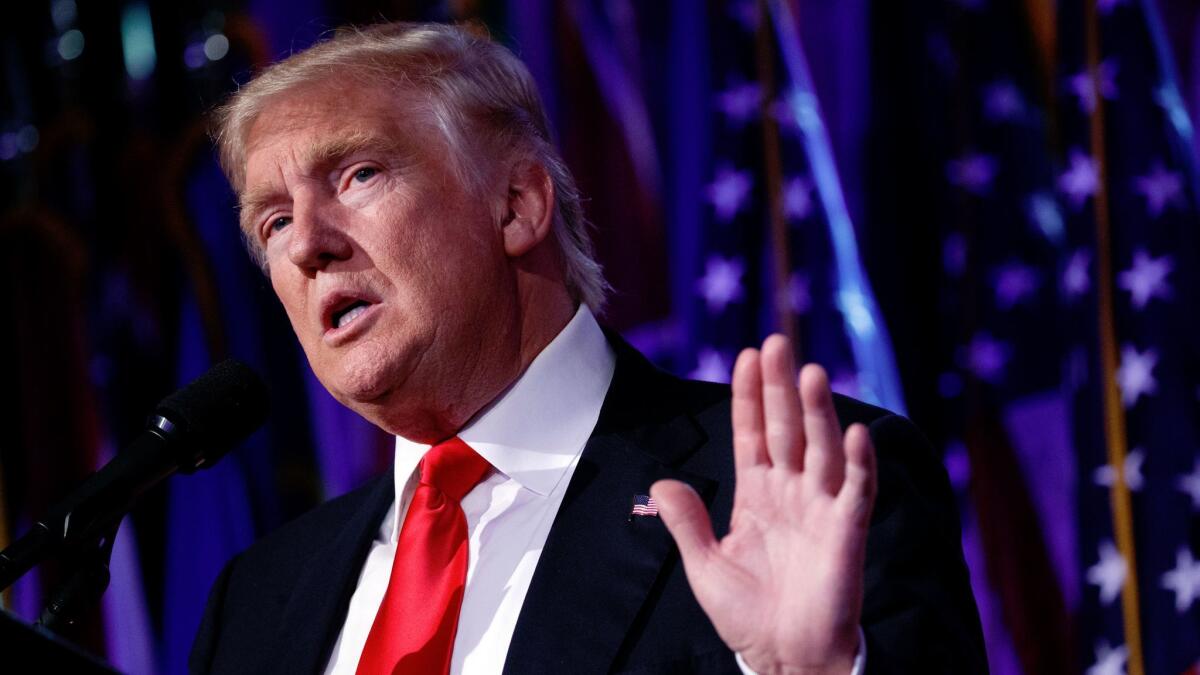Donald Trump has roused the poets to stinging verse

Hercules inspired poems. Ajax too. Walt Whitman celebrated himself, Shakespeare compared thee to a summer’s day, and T.S. Eliot knew that April was the cruelest month. But poets in our discomfiting age are riffing on President-elect Donald Trump, a man whose tax breaks and Twitter feeds contain multitudes.
Some bards have used Trump’s own words — their staccato blend of repetition and emphasis — to capture his singular essence and rhythms. Others have written odes of glee, rage, satire and bewilderment. They vary in talent and breadth and have titles like “Trumpety Trump,” “Trump’s War,” “Sympathy” and “Wig Wearing Llama (10W).” The poem “Donald Trump” by Matt Shade goes like this:
“Lemme tell ya, these people love me.
And I have a lot of money.
A LOT of money.
In fact, I know a lot about money
And a lot about other things as well.
Lemme tell you, I know a lot of things.
Just trust me on this one.”
The poem appears on Hello Poetry, a website for wide-ranging verse that has more than 1,100 poems pop up under the name Trump. The musings are written in haiku, free verse, limerick and rhyme. A number appear to have no structure at all, as if powerful emotions, mostly of the anti-Trump variety, burst forth into words.
It is no surprise that Trump has roused poets or those who see themselves as poets. Verse, after all, is a distillation of the ephemeral and the eternal, a need for language to summon image and find meaning. Trump’s campaign and defeat of Hillary Clinton exposed stark divisions and raised disquieting questions about the nation’s character, soul and identity, much like the Trojan War for Homer, Richard III for Shakespeare and the horrors of World War I for Wilfred Owen.
“What you’re getting these days is knee-jerk reactions,” said Michael Brown, co-editor of Off the Coast, an international poetry journal published in Maine. “Poets have a voice and that’s what they use. But with the popularity of poetry in the world and in America what you have to figure is that not everyone is a great poet.”
Brown said much of the verse that responds quickly to current events is not very good. It lacks the distance and time to put landmark moments into perspective.
“They’re pushing hot-button issues,” he said of many poets posting these days to websites or reading at open mic nights. “They’re trying to plug those things into a poem to get people to read it.”
He added that his journal will publish in its next edition a more textured poem that’s “a metaphorical conversation … thinly veiled and aimed at Trump.”
Some of the Trump poems allude to history, others to rough moments ahead; at least one conjures a duck, another “orange trolls.”
In the poem “Comb-over for Herr Trump,” Francie Lynch writes:
“Donald has a comb-over.
Hitler, a funny moustache.
Hair Donald?
Heil Hitler!”
Trump does have his supporters: “Call me a chump/But I’m with Trump.”
While Trump has inspired poetry, his own words carry a unique beat and syncopation that form a verse that, at least to his supporters, soothes in its timbre and disarms in its simplicity. His sentences can go rat-a-tat but they also circle back and double down, looping like threads in the wind. In his book “Bard of the Deal,” humorist and writer Hart Seely has collected “the first ever treasury of Trumpian verse — poems culled from a towering pile of speeches, interviews, utterances and tweets that has risen over the last 30 years.”
In the poem “Death,” featured in Bard, Trump offers a dark view of life:
“Sad. Horrible Statement.
I hate to say it, but I say it,
You know, because it’s true.
Life is what you do while you wait to die.”
His view is not any rosier in “Revenge Therapy,” taken from a 2007 discussion on “Larry King Live.” Of revenge, the poem quotes Trump as saying:
“It’s very therapeutic, Larry.
You’re a revenge person.
I know you very well.
You’re a revenge person.
It’s a very therapeutic way
of taking care of your own head.”
Verse by renowned poets has also been tapped to lend substance and insight into racism, division and other ills that have shaken the nation in recent months. “Differences of Opinion,” a 2006 work by British poet Wendy Cope, was popular online after Trump’s election. The verse is about an obstinate man spouting off falsehoods to a woman who cannot make him see the truth.
“He tells her that the earth is flat —
He knows the facts, and that is that.
In altercations fierce and long
She tries her best to prove him wrong.
But he has learned to argue well.
He calls her arguments unsound
And often asks her not to yell.
She cannot win. He stands his ground.
The planet goes on being round.”
The scribbling and keyboard pecking are likely to go on for a while as the president-elect tweets, Washington bristles and inauguration day approaches. A short poem by Ariel Ferguson published after the election on Hello Poetry is of the chin-up variety:
“And I think
Being happy in spite of it all
Is the most revolutionary thing you can do.”
See the most-read stories this hour »
Twitter: @JeffreyLAT
More to Read
Only good movies
Get the Indie Focus newsletter, Mark Olsen's weekly guide to the world of cinema.
You may occasionally receive promotional content from the Los Angeles Times.











